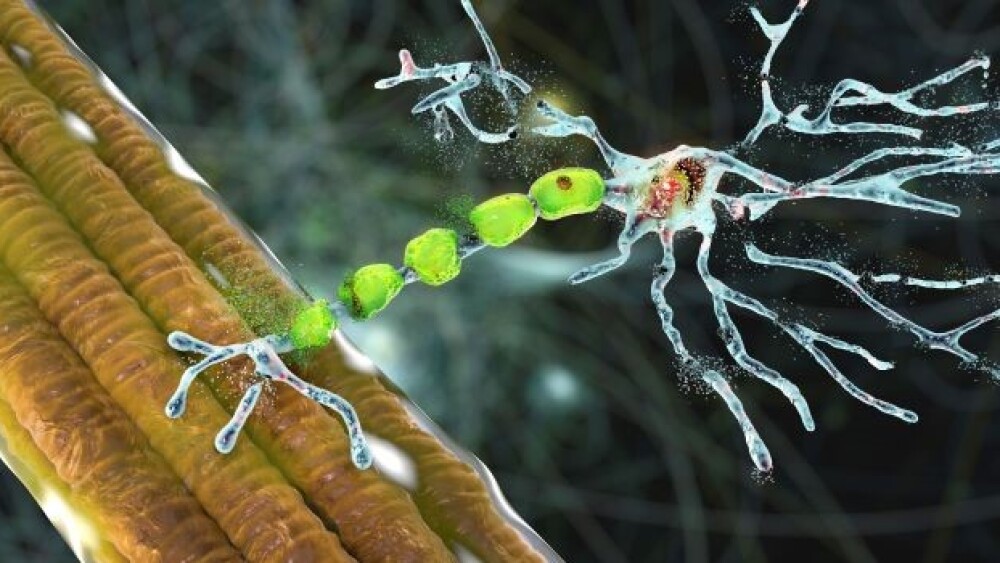Amid the limitations of current therapies for amyotrophic lateral sclerosis, a new GlobalData report points to novel disease-modifying drug approaches that could transform the space.
Pictured: Illustration of a motor neuron being degraded/iStock, Dr_Microbe
Given current limitations in existing therapies, the biopharma industry is adopting innovative approaches to amyotrophic lateral sclerosis, seeking to develop more effective disease-modifying drugs, according to a new report from data and analytics firm GlobalData.
Currently, there are more than 100 investigational pipeline candidates being studied for amyotrophic lateral sclerosis (ALS) in all stages of development and across various major markets, including the U.S., Canada, Japan and the U.K.
The candidates leverage different innovative modes of action against ALS, according to GlobalData. Some block the leukotriene receptor, while others make use of stem cells. Other investigational therapies include tyrosine kinase inhibitors, monoclonal antibodies, vitamin B12 and IL-2 antagonists.
‘‘To address the lack of efficacious options, the treatment horizon is now abuzz with exploration of novel approaches,” GlobalData healthcare analyst Momna Ali said in a statement, adding that among these investigational therapies is “a promising dozen” currently in Phase II and III studies.
Ali expects some of these ALS candidates to secure regulatory approval and hit the market within the next five years.
“This not only offers pharmaceutical companies’ lucrative opportunities for profit but also presents a ray of hope for patients eagerly waiting for disease-modifying drugs,” Ali said.
ALS has long been an attractive target for biopharma companies. The disease is characterized by progressive loss of muscle control, which manifests as trouble walking, weakness in the limbs, slurred speech and cognitive and behavioral changes.
In April 2023, the FDA approved Biogen and Ionis’ antisense oligonucleotide Qalsody (tofersen) for the treatment of superoxide dismutase 1 (SOD1) ALS. Up to 20% of familial cases of ALS and up to 2% of all cases are linked to underlying SOD1 genetic mutations. Qalsody is the first therapy approved to address a genetic form of ALS.
Other approved treatments include Amylyx’s Relyvrio (sodium phenylbutyrate and taurursodiol), Sanofi’s Rilutek (riluzole) and Mitsubishi Tanabe’s Radicava (edaravone).
Meanwhile, other biopharma companies continue to struggle advancing their own ALS candidates. Last month, Sanofi and development partner Denali Therapeutics announced that their ALS hopeful SAR443820/DNL788, an investigational RIPK1 blocker, could not significantly improve functional performance in the Phase II HIMALAYA trial.
In December 2023, the FDA rejected Clene’s bid for accelerated approval for its ALS candidate CNM-Au8, an oral suspension of catalytically active gold nanocrystals. The regulator said that biomarker data were insufficient to support accelerated approval.
Also having trouble with ALS is BrainStorm Cell Therapeutics, which in October 2023 voluntarily withdrew its application for its candidate NurOwn. The company’s decision comes after the FDA’s Cellular, Tissue, and Gene Therapies Advisory Committee voted overwhelmingly against approval, noting that there was currently not enough data to support NurOwn’s efficacy.
Tristan Manalac is an independent science writer based in Metro Manila, Philippines. Reach out to him on LinkedIn or email him at tristan@tristanmanalac.com or tristan.manalac@biospace.com.






